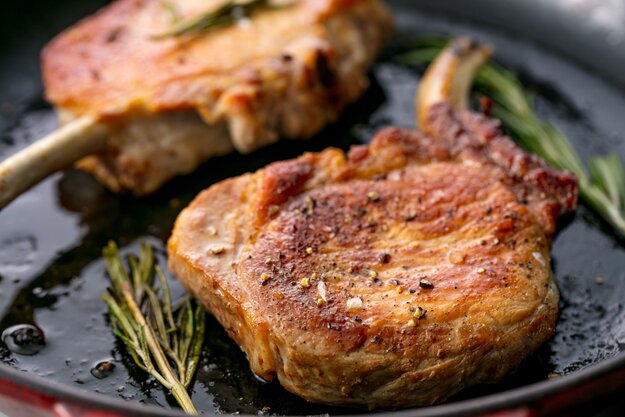Pork Chops Nutrition: Understanding the Facts About Calories, Protein, Fat, Carbs, and Vitamins
Pork chops are a popular meat dish enjoyed by many people all around the world. While they are delicious, it is also important to understand their nutritional value to ensure that you are maintaining a healthy diet. In this article, we will be discussing the facts about pork chop nutrition, including its calories, protein, fat, carbs, and vitamins.
What Are Pork Chops

Pork chops are a great source of protein and nutrients, but they are also known for being high in fat. It is important to understand the nutritional value of pork chops to ensure that they are incorporated into your diet in a healthy way. By learning about the calories, protein, fat, carbs, and vitamins in pork chops, you can make informed decisions about your diet and health.
Pork Chop Nutrition: Pork Chop Calories
Pork chops are a relatively low-calorie meat. A 3-ounce serving of pork chops contains approximately 150-200 calories, depending on how it is prepared. It is important to note that the calories in pork chops can vary greatly depending on the cut, the cooking method, and any added sauces or seasonings.
Pork Chop Nutrition: Pork Chop Protein
Pork chops are an excellent source of protein. A 3-ounce serving of pork chops contains approximately 26 grams of protein. Protein is essential for building and repairing muscle, and it also helps to keep you feeling full and satisfied after a meal.
Pork Chop Nutrition: Pork Chop Fat Content
Pork chops are known for being high in fat. A 3-ounce serving of pork chops contains approximately 9 grams of fat, with a majority of that fat being saturated. While saturated fat should be limited in the diet, it is important to note that pork chops also contain monounsaturated and polyunsaturated fats, which are considered healthy fats.
Pork Chop Nutrition: Pork Chop Carbs

Pork chops are a carb-free food, making them an excellent option for those following a low-carb diet. It is important to note, however, that any added sauces or seasonings may contain carbs, so be sure to check the labels for nutritional information.
Pork Chop Nutrition: Pork Chop Vitamins
Pork chops contain a variety of vitamins and minerals, including vitamin B6, vitamin B12, zinc, and selenium. Vitamin B6 and B12 are important for proper brain function and energy production, while zinc and selenium help to support the immune system and promote healthy skin.
How to Cook Pork Chops
Pork chops can be prepared in a variety of ways, including grilling, baking, broiling, and sautéing. To ensure that your pork chops are cooked to a safe temperature, it is important to use a meat thermometer. The internal temperature of pork should reach 145°F (63°C) before it is safe to eat.
Best Practices for Pork Consumption
When consuming pork, it is important to choose lean cuts and to limit your intake of processed pork products such as bacon and sausage. It is also important to prepare pork in a healthy way, such as by grilling or baking, rather than frying.
Health Benefits of Pork Chops
Pork chops offer a variety of health benefits, including their high protein content and nutrient density. Pork chops are also a good source of healthy fats, which can help to lower bad cholesterol levels and reduce the risk of heart disease. Additionally, pork chops contain a range of vitamins and minerals that are important for overall health, including vitamin B6, vitamin B12, zinc, and selenium.
Common Misconceptions about Pork Chops
There are several common misconceptions about pork chops that need to be addressed. Firstly, pork chops are often considered an unhealthy meat due to their high fat content. While pork chops do contain a significant amount of fat, it is important to remember that not all fats are created equal. The fat in pork chops is a mixture of saturated, monounsaturated, and polyunsaturated fats, with the latter two being considered healthy fats. Additionally, lean cuts of pork chops are available that contain less fat.
Another misconception about pork chops is that they are a low-quality meat. However, pork chops can be a high-quality source of protein and nutrients when they are sourced from high-quality animals and prepared in a healthy way.
Are Pork Chops Good For You
Pork chops can be a healthy addition to a balanced diet when consumed in moderation and prepared in a healthy way. Pork chops are a good source of protein, vitamins, and minerals, including vitamin B6, vitamin B12, zinc, and selenium. However, it is important to keep in mind that pork chops can also be high in fat and calories, so it is important to choose lean cuts and prepare them in a healthy way, such as grilling or baking instead of frying. Overall, pork chops can be a nutritious and delicious part of a healthy diet.